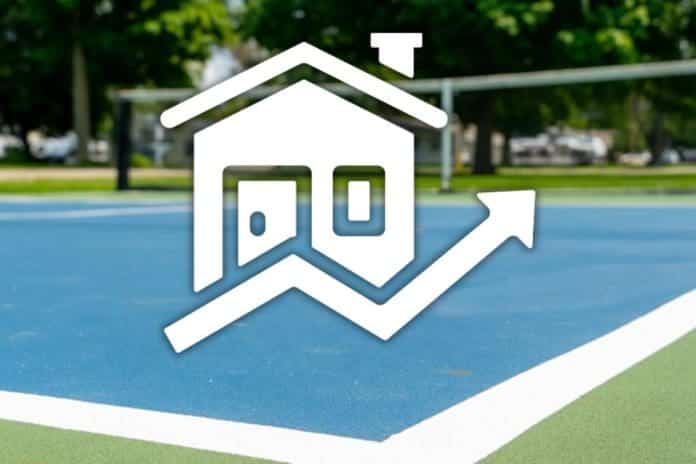The Pickleball Noise Dilemma: As pickleball’s popularity rises, homeowners near pickleball courts are encountering an unexpected challenge: the sport’s distinctive noise is complicating property sales. The constant “pop pop pop” of pickleball games is proving a deterrent to potential buyers, leading to stalled sales and even legal disputes for some homeowners. This article delves into how the noise issue is affecting the real estate market and the measures being taken to address it.
The Pickleball Noise Challenge Impacting Home Sales
The surge in pickleball’s popularity has inadvertently led to a significant challenge for some homeowners, creating what many are calling a “pickleball nightmare.” This growing issue involves the relentless noise generated by pickleball games, which has begun to impact property sales across the country.
Impact on Home Sales
The issue has become increasingly evident as homeowners near pickleball courts report difficulties selling their properties. One retiree found her home market stalled despite numerous showings and price reductions. The problem began when a neighboring social club converted old tennis courts into pickleball courts, introducing a constant “pop pop pop” noise that potential buyers found intolerable.
Faced with a harsh reality and no response from the social club, the homeowner is now forced to seek legal recourse to address the noise issue. With no offers on her property, she is forced to dip into her home equity to cover legal fees in hopes of resolving the issue.
The Science Behind the Noise
Pickleball, which saw a dramatic increase in popularity during the pandemic, has its roots in a 1967 invention. Despite its origins, the sport’s noise issue has only recently come into sharp focus. The sound produced by pickleball paddles striking the plastic ball is notably louder and more piercing than that of tennis, due to higher frequency sound waves.
Communities are attempting to mitigate the noise with sound-dampening panels, but the effectiveness of these solutions remains limited. In one town, where the community converted tennis courts to pickleball courts, residents are still struggling with persistent noise despite the installation of $22,000 worth of sound barriers.

Proactive Measures for Home Buyers and Sellers
For those looking to buy or sell homes near pickleball courts, there are several proactive steps to consider. Prospective buyers should investigate any nearby pickleball facilities and their potential noise impact. Home sellers, particularly those near pickleball courts, may need to work closely with real estate agents to develop effective strategies for marketing their properties amidst these challenges.
An engineer and founder of the Pickleball Sound Mediation Company is researching various solutions, including quieter paddle materials and advanced soundproofing techniques. While advancements are underway, homeowners and buyers must remain vigilant and informed about the potential noise issues associated with pickleball courts.
As the popularity of pickleball continues to grow, so too does the need for effective noise management strategies. Both buyers and sellers must navigate these challenges to ensure a smooth transition in an increasingly pickleball-affected real estate market.
News in Brief : The Pickleball Noise Dilemma
As pickleball’s popularity rises, the sport’s distinctive noise is affecting property sales near courts. Homeowners are facing stalled sales and legal disputes due to the persistent “pop pop pop” sound of pickleball games. For instance, a retiree’s home market stalled after nearby courts were converted, leading her to seek legal recourse. The sport’s louder noise compared to tennis is a growing concern. While some communities are installing sound-dampening panels, solutions have proven limited. Prospective buyers should investigate nearby pickleball facilities, and sellers may need strategic marketing to address noise issues. Ongoing research aims to develop quieter paddle materials and better soundproofing techniques.
ALSO READ: Destin Greenlights New Pickleball Courts: Construction Set for 2025

